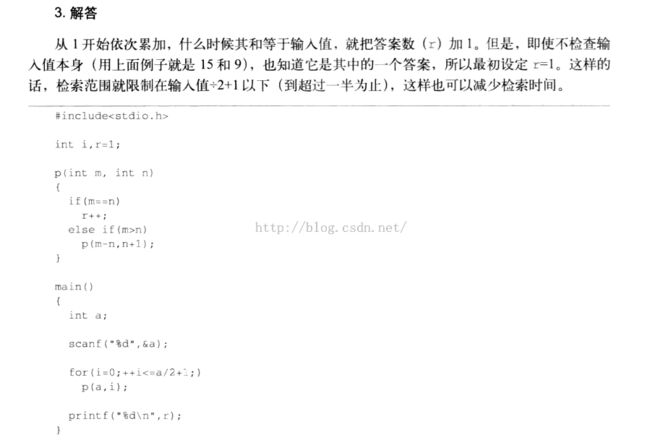javascript开发语言ecmascript
getSummaries(param){const{columns,data}=param;constsums=[];columns.forEach((column,index)=>{if(index===0){sums[index]='合计';return;}//if(index===2||index===3||index===4||index===5||index===6){if(index=
二叉树专题刷题
MogulNemenis
深度优先算法二叉树
二叉树的层平均值题目637.二叉树的层平均值-力扣(LeetCode)解题思路使用三个集合,sums集合存储每层的总和,count集合存储每层的节点数,averages存储每层的平均值。这里要讲一下add方法和set方法的区别add方法:用于向集合的末尾插入新的元素,是List接口中最常用的插入方法set方法:本质上是一种替换操作,要设置某个位置上的元素,这个位置必须已存在,否则会抛出异常代码pu
Day25(10.15)
xzsss
216组合总和IIIclassSolution:defcombinationSum3(self,k:int,n:int)->List[List[int]]:rets=[]temp=[]defsub(temp,inp,cout,sums):ifsums==nandcout==k:rets.append(temp[:])returnifsums>norcout>k:returnforiinrange(
leetcode- 区域和检索 - 数组可修改
程序员小2
leetcode-数组LeetCodeleetcode
给你一个数组nums,请你完成两类查询。其中一类查询要求更新数组nums下标对应的值另一类查询要求返回数组nums中索引left和索引right之间(包含)的nums元素的和,其中left0){ans+=sums[i];i-=last(i);}returnans;}privateintlast(inta){returna&(-a);}publicvoidupdate(intindex,intval
【LeetCode】区域和检索 - 数组不可变
QiuBika_061
LeetCode练习1.0
给定一个整数数组nums,求出数组从索引i到j(i≤j)范围内元素的总和,包含i,j两点。示例:给定nums=[-2,0,3,-5,2,-1],求和函数为sumRange()sumRange(0,2)->1sumRange(2,5)->-1sumRange(0,5)->-3说明:你可以假设数组不可变。会多次调用sumRange方法。classNumArray{int[]sums=null;publ
(力扣)1314.矩阵区域和
银氨溶液
leetcode矩阵算法前缀和c++
给你一个mxn的矩阵mat和一个整数k,请你返回一个矩阵answer,其中每个answer[i][j]是所有满足下述条件的元素mat[r][c]的和:i-k>sums;vector>matrixBlockSum(vector>&mat,intk){intrlen=mat.size(),clen=mat[0].size();sums.resize(rlen+1,vector(clen+1));//初
vue el-table自定义合计
034d42267c9d
需求:表格显示合计效果1、在table里添加ref=“table”show-summarysummary-method2、在方法里增加合计方法getSummaries(param){const{columns,data}=paramconstsums=[]columns.forEach((column,index)=>{if(index===0){sums[index]='合计'return}co
76. Minimum Window Substring
ujn20161222
leetcode
76.MinimumWindowSubstringclassSolution:defminWindow(self,s:str,t:str)->str:counts=defaultdict(int)forcint:counts[c]+=1begin=0end=0best_len=sys.maxsizebest_begin=-1sums=len(t)whileend=0:sums-=1end+=1wh
洛谷 P1466 集合 Subset Sums
zailingzhe
题目#include#includeusingnamespacestd;typedeflonglongll;lln,m;lldp[10001000];intmain(){cin>>n;m=(n*(n+1))/2;if(m%2){cout=i;j--)dp[j]+=dp[j-i];cout<<dp[m]/2;return0;}
洛谷P1466 集合 Subset Sums
weixin_33812433
这种小数据有什么开longlong的必要吗(激寒。。。qwq#include#include#include#include#includeusingnamespacestd;constintMAXN=40;intN,M;longlongf[800];intmain(){cin>>N;M=(N+1)*N/2;if(M&1){puts("0");return0;}M/=2;f[0]=1;for(in
洛谷P1466 集合 Subset Sums题解
wlmqlzm
题解算法动态规划
01背包求方案数类问题对于从1∼n1\simn1∼n的连续整数集合,将其划分成两个数字和相等的子集合。求划分方案数。1.容易想到,∑i=1ni\sum_{i=1}^ni∑i=1ni如果为奇数,则无法分成相等的两份,方案数为0.2.若∑i=1ni\sum_{i=1}^ni∑i=1ni为偶数,则任意一个方案的任意一个子集的数字和为∑i=1ni2\frac{\sum_{i=1}^ni}{2}2∑i=1n
vue+element ui实现表格的合计功能
拖拉机上的爱
vue.js前端javascript
效果:在vue中想实现合计功能,需要在标签中增加:summary-method="getSummaries"然后在methods中增加方法:(改变column.label即可)getSummaries(param){const{columns,data}=param;constsums=[];columns.forEach((column,index)=>{if(index===0){sums[i
table表格列合计 vue+element table表格列合计
ratel️
vue.jselementuijavascript
//列求和getSummaries(param){const{columns,data}=param;//这里可以看出,自定义函数会传入每一列,以及数据constsums=[];columns.forEach((column,index)=>{if(index===0){sums[index]='总计';return;}elseif(index>=1){//index>=1后的列进行求和//页面分
Vue 3,element table表格动态添加
可爱的秋秋啊
前端vue.jselementuijavascript
el-table实现表格动态新增/插入/删除表格行,可编辑单元格效果图代码实现//表尾合计constcalculateSummary=({columns,data})=>{constsums=[]columns.forEach((column,index)=>{if(index===0){sums[index]='合计总分'return}leta=activeList.value=='first'
2018-08-30day8作业
祖国的花朵_3980
1.编写一个函数,求1+2+3+...+Ndefsums(N):sum=0forainrange(N+1):sum+=aprint(sum)sums(5)#15sums(12)#782.编写一个函数,求多个数中的最大值defbigmax(x,y,z):ifx>y:maxnum=xelse:maxum=yifz>maxnum:maxnum=zreturnmaxnumbigmax(10,20,5)3.
vue3中el-table实现表格合计行
可爱的秋秋啊
js前端vue.jsjavascript前端
el-table标签上加属性show-summary:summary-method=“getSummary”js中添加函数(合计没有额外的附件参数添加)//合计constcalculateSummary=({columns,data})=>{constsums=[]columns.forEach((column,index)=>{if(index===0){sums[index]='合计总分're
LeetCode 974 Subarray Sums Divisible by K
被称为L的男人
题目描述GivenanarrayAofintegers,returnthenumberof(contiguous,non-empty)subarraysthathaveasumdivisiblebyK.Example1:Input:A=[4,5,0,-2,-3,1],K=5Output:7Explanation:Thereare7subarrayswithasumdivisiblebyK=5:[4
【LeetCode-剑指offer】-- 13.二维区域和检索-矩阵不可变
小d<>
#剑指offerleetcode算法
13.二维区域和检索-矩阵不可变方法:一维前缀和初始化时对矩阵的每一行计算前缀和,检索时对二维区域中的每一行计算子数组和,然后对每一行的子数组和计算总和。具体实现方面,创建m行n+1列的二维数组sums,其中m和n分别是矩阵matrix的行数和列数,sums[i]为matrix[i]的前缀和数组。将sums的列数设为n+1的目的是为了方便计算每一行的子数组和,不需要对col1=0的情况特殊处理。c
element-ui--table表格自定义计算合计功能
Colesyn L.
vue
element-ui–table表格自定义计算合计功能直接贴代码了js//表格总计的时间getSummaries(param){const{columns,data}=param;constsums=[];columns.forEach((column,index)=>{if(index===0){sums[index]="总计";//index表示表格的第几列开始计算}elseif(index=
latex表达式 -- 公式等号对其
天下一般
后台latex
公式的换行:使用\\就可以使得公式换行比如下面的表达式在等号前面加上了\\,公式就换行了。$$\sum_{r=i+1}^{R+1}\sum_{l=L}^{i}sum[r]-sum[l]\\=(i-L+1)\sum_{r=i+1}^{R+1}sum[r]-(R-i+1)\sum_{l=L}^{i}sum[l]\\=(i-L+1)(sums[R+2]-sums[i+1])-(R-i+1)(sums[i
373. Find K Pairs with Smallest Sums
ujn20161222
leetcode
373.FindKPairswithSmallestSumsfromheapqimport*classSolution:defkSmallestPairs(self,nums1:List[int],nums2:List[int],k:int)->List[List[int]]:heap=[(nums1[0]+nums2[0],0,0)]res=[]foriinrange(k):ifnotheap:
数据结构学习 jz13衣橱整理
_Rindo
数据结构学习数据结构学习深度优先
关键词:搜索算法dfsbfs回溯题目:各数位之和:求法代码:intsums(intx){ints=0;while(x!=0){s+=x%10;x=x/10;}returns;}总的思路:这道题是求可以到达的格子数,想到可以用搜索算法来做,可以用dfs或者bfs。可以去看这位大佬的分析。我基本是按照他的思路写的,但是把代码写的好看了一些。求各数位之和我用了封装好的sums函数,看起来舒服一些。我一开
Leetcode 974. Subarray Sums Divisible by K
SnailTyan
文章作者:Tyan博客:noahsnail.com|CSDN|1.DescriptionSubarraySumsDivisiblebyK2.Solution解析:Version1,使用前缀和来解决,遍历数组,求前缀和,然后求余数,统计余数次数并保存到字典中,当碰到余数相同时,则意味着当前数组减去之前的前缀和数组可以被k整除,将次数加到count中,更新余数次数。注意,假设第一个数就可以整除k,此时
ubuntu qt 源码编译
痕忆丶
linuxqt开发语言
官方源码下载地址:源码地址选择要下载的版本dmg结尾的是MacOS系统里使用的Qt库,qt-everywhere-opensource-src-4.7.0是Qt源码包,有zip和tar.gz两个压缩格式的,两个内容是一样的,只是zip一般在Windows下比较流行,tar.gz是Linux上流行的压缩格式。有些有md5sums-4.8.6是以上文件的校验和,changes-4.8.6是Qt版本日志
区域和检索算法(leetcode第303题)
蹲家宅宅
算法算法leetcode
题目描述:给定一个整数数组nums,处理以下类型的多个查询:计算索引left和right(包含left和right)之间的nums元素的和,其中lefttypedefstruct{int*sums;}NumArray;NumArray*numArrayCreate(int*nums,intnumsSize){NumArray*ret=(NumArray*)malloc(sizeof(NumArra
Day14 面向对象基础
风月辞寒
一.编程思想编程思想:面向过程编程(穷人思想),函数式编程,面向对象编程(富豪)面向过程编程-算法和逻辑函数式编程-函数面向对象编程-类和对象1.求1+...+100sum1=0forninrange(1,101):sum1+=nprint(sum1)defsum1(x:int):sums=0forminrange(1,x+1):sums+=mreturnsumsprint(sum1(100))p
2018-10-10 Day-9 homework
W_00ee
编写一个函数,求1+2+3+...+NdefW_sum(n):sums=0foriinrange(n+1):sums+=iprint(sums)W_sum(n=int(input('请输入n的值:')))编写一个函数,求多个数中的最大值defW_max(list1):max1=0fornuminlist1:ifmax1{1:'a',2:'b',3:'c'}defexchange(x,y):t=xy
C. Increase Subarray Sums - 思维
.y.a.o.
算法c++思维
题面分析最优方法就是至少选k个数,这k个数都可以加上x,一段的最大距离可以通过前缀和来实现,还需要一个数组记录当前最小的前缀和,每次只需要当前前缀和减去长度为k之前的最小前缀和即可。代码#include#defineintlonglongusingnamespacestd;voidsolve(){intn,x;cin>>n>>x;vectora(n+1);vectorg(n+1);for(inti
批量获取文件MD5(Jenkins)
Ya-Jun
环境的搭建和使用jenkinscmdmd5
1.下载小工具:http://www.pc-tools.net/win32/md5sums/下载这个软件md5sums.exe2.配置环境变量:D:\md5sums(文件路径D:\md5sums\md5sums.exe)3.生成md5校验文件:md5sums-u*.apk>package.md5注:使用通配符*,代表文件夹内所有.apk文件4.可以用于Jenkins等场景使用。
C/C++常用工具库下载,未完待续...
cfl927096306
嵌入式LinuxC/C++工具
libmd5,此外还可以看到md5sum这个工具的实现GitHub-jeffboody/libmd5:LibrarytocomputeMD5sums.tinyxml2GitHub-leethomason/tinyxml2:TinyXML2isasimple,small,efficient,C++XMLparserthatcanbeeasilyintegratedintootherprograms.
java线程的无限循环和退出
3213213333332132
java
最近想写一个游戏,然后碰到有关线程的问题,网上查了好多资料都没满足。
突然想起了前段时间看的有关线程的视频,于是信手拈来写了一个线程的代码片段。
希望帮助刚学java线程的童鞋
package thread;
import java.text.SimpleDateFormat;
import java.util.Calendar;
import java.util.Date
tomcat 容器
BlueSkator
tomcatWebservlet
Tomcat的组成部分 1、server
A Server element represents the entire Catalina servlet container. (Singleton) 2、service
service包括多个connector以及一个engine,其职责为处理由connector获得的客户请求。
3、connector
一个connector
php递归,静态变量,匿名函数使用
dcj3sjt126com
PHP递归函数匿名函数静态变量引用传参
<!doctype html>
<html lang="en">
<head>
<meta charset="utf-8">
<title>Current To-Do List</title>
</head>
<body>
属性颜色字体变化
周华华
JavaScript
function changSize(className){
var diva=byId("fot")
diva.className=className;
}
</script>
<style type="text/css">
.max{
background: #900;
color:#039;
将properties内容放置到map中
g21121
properties
代码比较简单:
private static Map<Object, Object> map;
private static Properties p;
static {
//读取properties文件
InputStream is = XXX.class.getClassLoader().getResourceAsStream("xxx.properti
[简单]拼接字符串
53873039oycg
字符串
工作中遇到需要从Map里面取值拼接字符串的情况,自己写了个,不是很好,欢迎提出更优雅的写法,代码如下:
import java.util.HashMap;
import java.uti
Struts2学习
云端月影
最近开始关注struts2的新特性,从这个版本开始,Struts开始使用convention-plugin代替codebehind-plugin来实现struts的零配置。
配置文件精简了,的确是简便了开发过程,但是,我们熟悉的配置突然disappear了,真是一下很不适应。跟着潮流走吧,看看该怎样来搞定convention-plugin。
使用Convention插件,你需要将其JAR文件放
Java新手入门的30个基本概念二
aijuans
java新手java 入门
基本概念: 1.OOP中唯一关系的是对象的接口是什么,就像计算机的销售商她不管电源内部结构是怎样的,他只关系能否给你提供电就行了,也就是只要知道can or not而不是how and why.所有的程序是由一定的属性和行为对象组成的,不同的对象的访问通过函数调用来完成,对象间所有的交流都是通过方法调用,通过对封装对象数据,很大限度上提高复用率。 2.OOP中最重要的思想是类,类是模板是蓝图,
jedis 简单使用
antlove
javarediscachecommandjedis
jedis.RedisOperationCollection.java
package jedis;
import org.apache.log4j.Logger;
import redis.clients.jedis.Jedis;
import java.util.List;
import java.util.Map;
import java.util.Set;
pub
PL/SQL的函数和包体的基础
百合不是茶
PL/SQL编程函数包体显示包的具体数据包
由于明天举要上课,所以刚刚将代码敲了一遍PL/SQL的函数和包体的实现(单例模式过几天好好的总结下再发出来);以便明天能更好的学习PL/SQL的循环,今天太累了,所以早点睡觉,明天继续PL/SQL总有一天我会将你永远的记载在心里,,,
函数;
函数:PL/SQL中的函数相当于java中的方法;函数有返回值
定义函数的
--输入姓名找到该姓名的年薪
create or re
Mockito(二)--实例篇
bijian1013
持续集成mockito单元测试
学习了基本知识后,就可以实战了,Mockito的实际使用还是比较麻烦的。因为在实际使用中,最常遇到的就是需要模拟第三方类库的行为。
比如现在有一个类FTPFileTransfer,实现了向FTP传输文件的功能。这个类中使用了a
精通Oracle10编程SQL(7)编写控制结构
bijian1013
oracle数据库plsql
/*
*编写控制结构
*/
--条件分支语句
--简单条件判断
DECLARE
v_sal NUMBER(6,2);
BEGIN
select sal into v_sal from emp
where lower(ename)=lower('&name');
if v_sal<2000 then
update emp set
【Log4j二】Log4j属性文件配置详解
bit1129
log4j
如下是一个log4j.properties的配置
log4j.rootCategory=INFO, stdout , R
log4j.appender.stdout=org.apache.log4j.ConsoleAppender
log4j.appender.stdout.layout=org.apache.log4j.PatternLayout
log4j.appe
java集合排序笔记
白糖_
java
public class CollectionDemo implements Serializable,Comparable<CollectionDemo>{
private static final long serialVersionUID = -2958090810811192128L;
private int id;
private String nam
java导致linux负载过高的定位方法
ronin47
定位java进程ID
可以使用top或ps -ef |grep java
![图片描述][1]
根据进程ID找到最消耗资源的java pid
比如第一步找到的进程ID为5431
执行
top -p 5431 -H
![图片描述][2]
打印java栈信息
$ jstack -l 5431 > 5431.log
在栈信息中定位具体问题
将消耗资源的Java PID转
给定能随机生成整数1到5的函数,写出能随机生成整数1到7的函数
bylijinnan
函数
import java.util.ArrayList;
import java.util.List;
import java.util.Random;
public class RandNFromRand5 {
/**
题目:给定能随机生成整数1到5的函数,写出能随机生成整数1到7的函数。
解法1:
f(k) = (x0-1)*5^0+(x1-
PL/SQL Developer保存布局
Kai_Ge
近日由于项目需要,数据库从DB2迁移到ORCAL,因此数据库连接客户端选择了PL/SQL Developer。由于软件运用不熟悉,造成了很多麻烦,最主要的就是进入后,左边列表有很多选项,自己删除了一些选项卡,布局很满意了,下次进入后又恢复了以前的布局,很是苦恼。在众多PL/SQL Developer使用技巧中找到如下这段:
&n
[未来战士计划]超能查派[剧透,慎入]
comsci
计划
非常好看,超能查派,这部电影......为我们这些热爱人工智能的工程技术人员提供一些参考意见和思想........
虽然电影里面的人物形象不是非常的可爱....但是非常的贴近现实生活....
&nbs
Google Map API V2
dai_lm
google map
以后如果要开发包含google map的程序就更麻烦咯
http://www.cnblogs.com/mengdd/archive/2013/01/01/2841390.html
找到篇不错的文章,大家可以参考一下
http://blog.sina.com.cn/s/blog_c2839d410101jahv.html
1. 创建Android工程
由于v2的key需要G
java数据计算层的几种解决方法2
datamachine
javasql集算器
2、SQL
SQL/SP/JDBC在这里属于一类,这是老牌的数据计算层,性能和灵活性是它的优势。但随着新情况的不断出现,单纯用SQL已经难以满足需求,比如: JAVA开发规模的扩大,数据量的剧增,复杂计算问题的涌现。虽然SQL得高分的指标不多,但都是权重最高的。
成熟度:5星。最成熟的。
Linux下Telnet的安装与运行
dcj3sjt126com
linuxtelnet
Linux下Telnet的安装与运行 linux默认是使用SSH服务的 而不安装telnet服务 如果要使用telnet 就必须先安装相应的软件包 即使安装了软件包 默认的设置telnet 服务也是不运行的 需要手工进行设置 如果是redhat9,则在第三张光盘中找到 telnet-server-0.17-25.i386.rpm
PHP中钩子函数的实现与认识
dcj3sjt126com
PHP
假如有这么一段程序:
function fun(){
fun1();
fun2();
}
首先程序执行完fun1()之后执行fun2()然后fun()结束。
但是,假如我们想对函数做一些变化。比如说,fun是一个解析函数,我们希望后期可以提供丰富的解析函数,而究竟用哪个函数解析,我们希望在配置文件中配置。这个时候就可以发挥钩子的力量了。
我们可以在fu
EOS中的WorkSpace密码修改
蕃薯耀
修改WorkSpace密码
EOS中BPS的WorkSpace密码修改
>>>>>>>>>>>>>>>>>>>>>>>>>>>>>>>>>>>>>>>>>>
蕃薯耀 201
SpringMVC4零配置--SpringSecurity相关配置【SpringSecurityConfig】
hanqunfeng
SpringSecurity
SpringSecurity的配置相对来说有些复杂,如果是完整的bean配置,则需要配置大量的bean,所以xml配置时使用了命名空间来简化配置,同样,spring为我们提供了一个抽象类WebSecurityConfigurerAdapter和一个注解@EnableWebMvcSecurity,达到同样减少bean配置的目的,如下:
applicationContex
ie 9 kendo ui中ajax跨域的问题
jackyrong
AJAX跨域
这两天遇到个问题,kendo ui的datagrid,根据json去读取数据,然后前端通过kendo ui的datagrid去渲染,但很奇怪的是,在ie 10,ie 11,chrome,firefox等浏览器中,同样的程序,
浏览起来是没问题的,但把应用放到公网上的一台服务器,
却发现如下情况:
1) ie 9下,不能出现任何数据,但用IE 9浏览器浏览本机的应用,却没任何问题
不要让别人笑你不能成为程序员
lampcy
编程程序员
在经历六个月的编程集训之后,我刚刚完成了我的第一次一对一的编码评估。但是事情并没有如我所想的那般顺利。
说实话,我感觉我的脑细胞像被轰炸过一样。
手慢慢地离开键盘,心里很压抑。不禁默默祈祷:一切都会进展顺利的,对吧?至少有些地方我的回答应该是没有遗漏的,是不是?
难道我选择编程真的是一个巨大的错误吗——我真的永远也成不了程序员吗?
我需要一点点安慰。在自我怀疑,不安全感和脆弱等等像龙卷风一
马皇后的贤德
nannan408
马皇后不怕朱元璋的坏脾气,并敢理直气壮地吹耳边风。众所周知,朱元璋不喜欢女人干政,他认为“后妃虽母仪天下,然不可使干政事”,因为“宠之太过,则骄恣犯分,上下失序”,因此还特地命人纂述《女诫》,以示警诫。但马皇后是个例外。
有一次,马皇后问朱元璋道:“如今天下老百姓安居乐业了吗?”朱元璋不高兴地回答:“这不是你应该问的。”马皇后振振有词地回敬道:“陛下是天下之父,
选择某个属性值最大的那条记录(不仅仅包含指定属性,而是想要什么属性都可以)
Rainbow702
sqlgroup by最大值max最大的那条记录
好久好久不写SQL了,技能退化严重啊!!!
直入主题:
比如我有一张表,file_info,
它有两个属性(但实际不只,我这里只是作说明用):
file_code, file_version
同一个code可能对应多个version
现在,我想针对每一个code,取得它相关的记录中,version 值 最大的那条记录,
SQL如下:
select
*
VBScript脚本语言
tntxia
VBScript
VBScript 是基于VB的脚本语言。主要用于Asp和Excel的编程。
VB家族语言简介
Visual Basic 6.0
源于BASIC语言。
由微软公司开发的包含协助开发环境的事
java中枚举类型的使用
xiao1zhao2
javaenum枚举1.5新特性
枚举类型是j2se在1.5引入的新的类型,通过关键字enum来定义,常用来存储一些常量.
1.定义一个简单的枚举类型
public enum Sex {
MAN,
WOMAN
}
枚举类型本质是类,编译此段代码会生成.class文件.通过Sex.MAN来访问Sex中的成员,其返回值是Sex类型.
2.常用方法
静态的values()方
